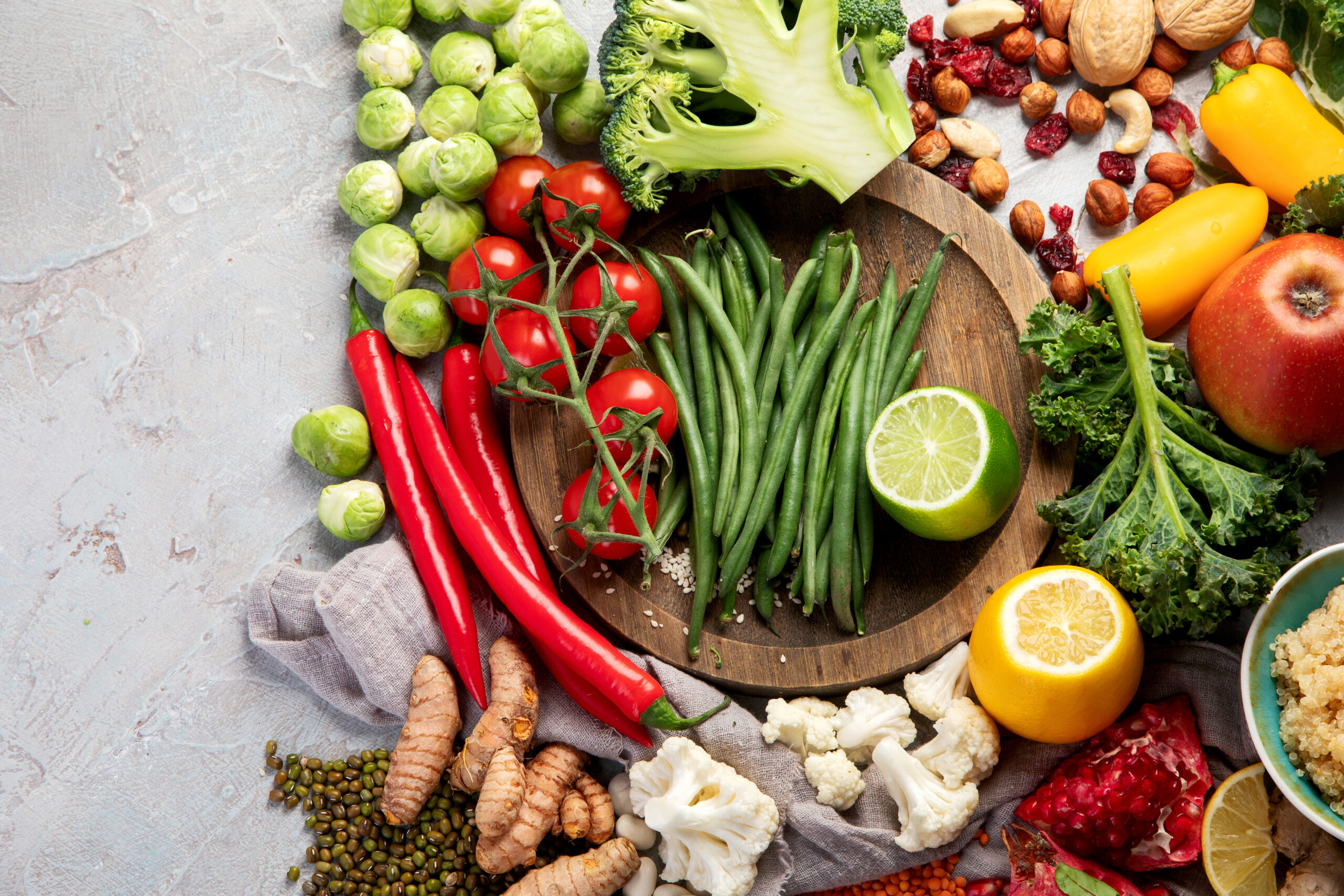What do we mean by ‘green diet’?
A green diet is a way of eating that is healthy for both individuals and the planet. It emphasises consuming foods that are produced in ways that promote environmental sustainability and economic viability. A green diet typically includes a variety of nutrient-dense whole foods, with an emphasis on plant-based sources of protein, whole grains, fruits, vegetables and healthy fats.
A sustainable diet also takes into account the environmental impact of food production, transportation and distribution. This means choosing foods that are grown or raised in ways that conserve natural resources, minimise greenhouse gas emissions and protect biodiversity.
For example, green diets may include locally sourced, organic or non-genetically modified organisms foods, as well as foods that are produced using sustainable farming practices such as agroforestry and crop rotation.
In addition, a sustainable diet also takes into account social and economic factors such as fair labour practices, animal welfare and support for local food systems. It may involve reducing food waste, choosing foods with minimal packaging and using cooking methods that conserve energy.
Sustainable eating not only supports the health and wellbeing of both individuals and the planet but seeks to create a more equitable and sustainable food system for all.
Why is a green diet better for the environment?
A green diet is good for the environment for several reasons:
- Lower greenhouse gas emissions: Plant-based foods tend to have a lower carbon footprint than animal-based foods. This is because the production of meat and dairy products involves more resources, such as land, water and feed, which generates more greenhouse gas emissions.
- Reduced water use: Producing animal-based foods requires more water than producing plant-based foods. By eating more plant-based foods, we can reduce our water footprint and conserve water resources.
- Reduced land use: Animal agriculture is a leading cause of deforestation and habitat loss. By eating fewer animal-based foods and more plant-based foods, we can reduce our impact on natural ecosystems.
- Reduced pollution: The production of animal-based foods generates more pollution than plant-based foods. This includes pollution from manure, fertilisers and pesticides, which can have negative impacts on water and air quality.
- Reduced waste: Plant-based foods tend to generate less waste than animal-based foods. This is because animals require more resources to produce the same amount of food as plants, so more food is wasted in the production process.
The evidence shows that overall, by moving towards a greener diet, we can reduce our impact on the environment and help mitigate the effects of climate change.
However, it is important to note that not all plant-based foods are equally environmentally friendly. For example, some fruits and vegetables require significant amounts of water and energy to grow, particularly when grown out of season or in regions where they are not native.
Additionally, the transportation and packaging of food can also contribute to its environmental impact. Therefore, if you are looking to eat more sustainability, it’s important to consider these factors when making food choices and to choose foods that are both healthy and environmentally sustainable.
Counting carbon: The foods that have the biggest impact on climate change
Not all foods are equal when it comes to carbon production. Many types of popular, everyday foods have a significantly negative impact on the environment. The main offenders include:
- Meat: The production of meat requires large amounts of land, water and energy. Livestock farming is also responsible for greenhouse gas emissions and pollution.
- Dairy: Like meat, dairy products such as milk, cheese and butter require a lot of resources to produce and can contribute to greenhouse gas emissions and water pollution.
- Processed foods: Foods that are highly processed often contain artificial ingredients, preservatives and packaging that can be harmful to the environment. The manufacturing of these products can also require large amounts of energy and water.
- Seafood: Some types of seafood, such as shrimp and salmon, can be farmed in ways that are harmful to the environment. Overfishing and destructive fishing practices can also deplete fish populations and damage marine ecosystems.
- Palm oil: Palm oil is used in a wide range of products, including food, cosmetics and biofuels. The production of palm oil has been linked to deforestation, habitat destruction and the displacement of indigenous communities.
Not all foods within these categories are equally harmful to the environment. For example, some types of meat (such as chicken) have a lower environmental impact than others (such as beef). However, in general, reducing the consumption of these types of foods has been shown to have a positive impact on the environment.
From T-bone to tofu: Meat versus plant-based diets
There are many studies that have compared the carbon footprint of meat-based diets to plant-based or meat-reduced diets. Here are a few key headlines:
| Beef produces 70.6kg of emissions per kg of food, versus 3.2kg from tofu. Source: UN | Plant-based meat emits 30%–90% less greenhouse gas than conventional meatSource: GFI |
A UN study published in Nature in 2019 found that reducing meat consumption is one of the most effective ways to reduce an individual’s carbon footprint.
Plant-based diets have consistently been shown to have a significantly lower carbon footprint than meat-based diets, with some studies suggesting that vegan and vegetarian diets can reduce greenhouse gas emissions by up to 70 per cent.
Meat-reduced diets, which involve consuming smaller amounts of meat and more plant-based foods, can also help reduce carbon emissions, although to a lesser extent than fully plant-based diets.
Eating green: Handy tips to reduce the impact of your diet on the environment
Here are some tips for reducing your environmental impact through a green diet:
- Eat more plant-based meals: Consider replacing some – or all – of your meat-based meals with plant-based alternatives, such as legumes, tofu and vegetables.
- Choose organic and locally sourced foods: Opt for organic produce whenever possible to avoid consuming harmful pesticides and chemicals. Also, try to buy locally sourced foods to reduce transportation emissions and support local farmers.
- Minimise food waste: Only buy what you need and consume food before it goes off. You can also compost food scraps to reduce the amount of waste sent to landfills.
- Choose fresh: Choose fresh, whole foods whenever possible to reduce your carbon footprint, as they require less energy to produce and transport compared with processed and packaged foods.
- Use eco-friendly cooking methods: Use energy-efficient cooking methods, such as steaming, roasting and stir-frying. Also, consider using an induction cooktop or a slow cooker to save energy.
- Drink tap water instead of bottled water: Drinking tap water instead of bottled water can significantly reduce plastic waste and energy used in transportation.
Support sustainable seafood: Choose sustainably sourced seafood that has been caught or farmed in an environmentally friendly way.
Planting the seeds of change: The green movements that are changing the game
There are many initiatives and campaigns aimed at reducing the environmental impact of diets. Some of the most successful include:
| Campaign name | Purpose of the campaign |
|---|
There’s no doubt that the planet has been impacted by our dietary choices. Forests have been destroyed to create room for raising livestock and cultivating crops to feed them, resulting in depleted oceans due to overfishing and trawling. The production of food not only causes the most significant wildlife loss but also contributes to climate change.
But by making changes to your diet, you can help to make a difference to the planet. If you are motivated to make that change, it’s always best to consult with a healthcare professional or registered dietitian to ensure that a green diet is right for you.
Find out more on green shopping options here.
FAQs: Curious about switching to a green diet? We’ve got the answers to your questions…
? What is a green diet?
A green diet, sometimes called an eco-friendly or sustainable diet, is one that is focused on reducing the environmental impact of food production and consumption. It usually involves consuming a plant-based diet with a focus on whole foods, seasonal and locally sourced ingredients, and reducing food waste.
? Why is a green diet important?
A green diet is important because food production is a major contributor to greenhouse gas emissions, deforestation and biodiversity loss. By choosing to eat foods that are produced in a more sustainable way, we can reduce our environmental impact and promote a healthier planet.
? What are some green foods?
Some eco-friendly foods include fruits and vegetables that are in season and locally grown, whole grains, legumes, nuts and seeds. Choosing plant-based proteins instead of animal products can also be more eco-friendly.
? How can I reduce food waste?
Reducing food waste is an important part of a sustainable diet. You can reduce food waste by planning meals ahead of time, storing food properly, buying only what you need and using leftovers to make new meals.
? Is a green diet more expensive?
A green diet can be more expensive in some cases, especially if you choose to buy organic or locally sourced foods. However, eating a plant-based diet can also be more affordable than a diet that includes a lot of meat and dairy products.
? Can a green diet provide enough nutrients?
Yes, a green diet can provide all the necessary nutrients for a healthy diet. It is important to choose a variety of foods and include sources of protein, calcium, iron and other important nutrients.
? Can I still eat meat and be eco-friendly?
Eating meat has a higher environmental impact than eating a plant-based diet. To lessen that impact, but still eat meat, you should choose meat that is sustainably raised and reduce meat consumption overall – this can help reduce your environmental impact.
? What are some eco-friendly cooking methods?
Eco-friendly cooking methods include using a slow cooker or pressure cooker, which uses less energy than an oven or stove. Cooking with a lid on pots and pans and using energy-efficient appliances can also reduce energy usage.
? How can I start a green diet?
You can start a green diet by making small changes, such as incorporating more plant-based meals into your diet, buying local and in-season produce and reducing food waste. Gradually adopting these changes can help you transition to a more sustainable diet over time.



